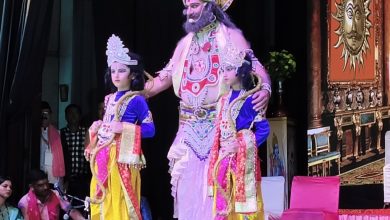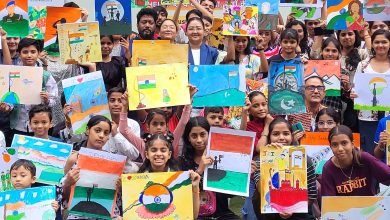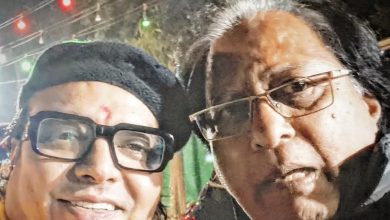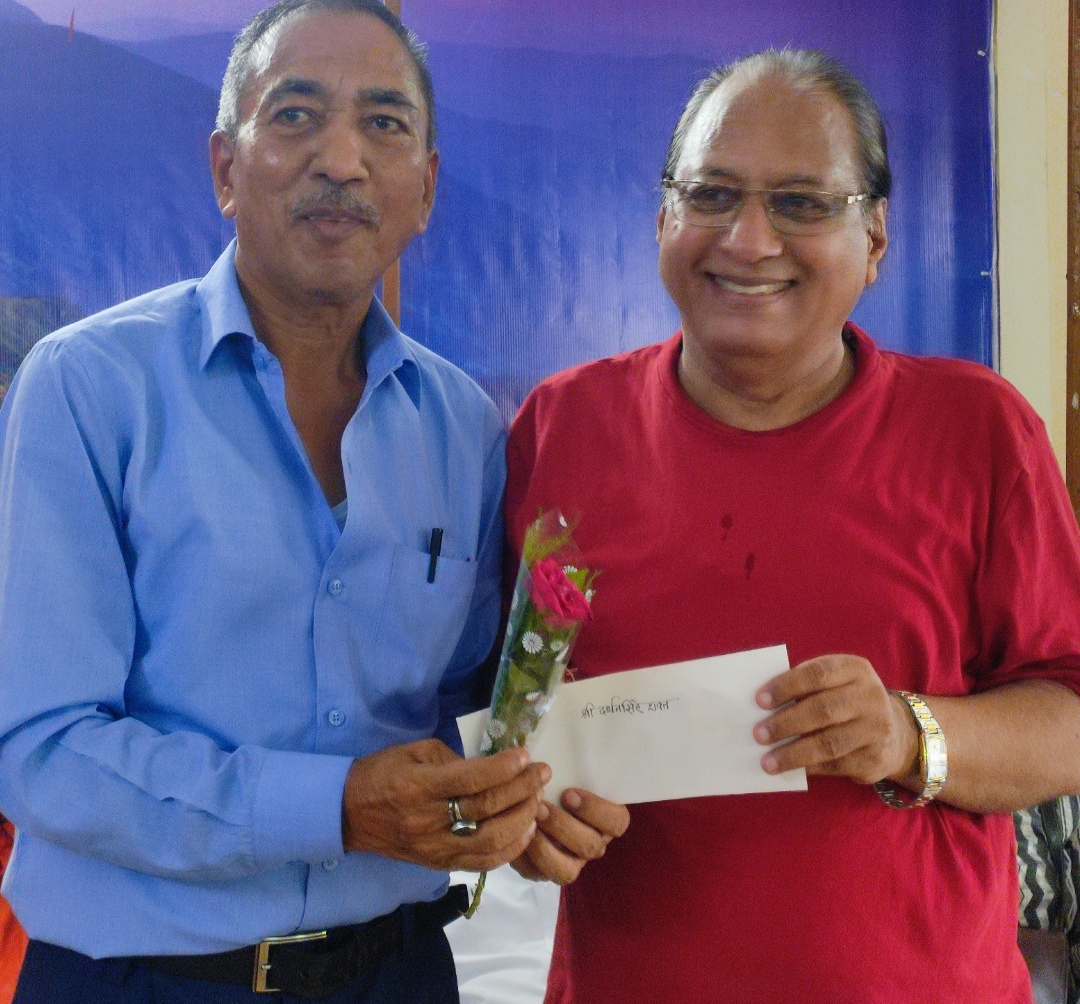“The Role of Pali and Prakrit in the Indian Knowledge System” – One day Seminar held at GBU, Greater Noida
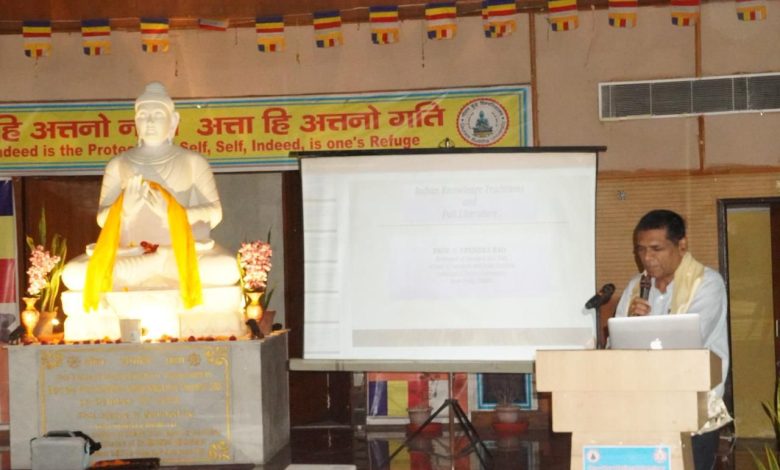
A One-Day National Seminar on “The Role of Pali and Prakrit in the Indian Knowledge System” 
was organized by the School of Buddhist Studies and Civilisation at Gautam Buddha University in collaboration with the Uttar Pradesh Sanskrit Sansthan, Lucknow. The event was held under the patronage of the Honourable Vice-Chancellor of Gautam Buddha University, Prof. Rana Pratap Singh, and coordinated by Dr. Gyanaditya Shakya. It took place at the Mahatma Jyotiba Phule Meditation Centre, Gautam Buddha University, Greater Noida, on August 25, 2025.
In his presidential address, Vice Chancellor Prof. Rana Pratap Singh highlighted the importance of preserving the rich heritage of the Pali and Prakrit languages. He stated that scholars in these fields have a responsibility to uncover the valuable insights and knowledge systems of India that are associated with these ancient languages. During his keynote address, Prof. Indra Narayan Singh from the University of Delhi discussed the relevance of Pali and Prakrit in the Indian knowledge tradition. Dr. Gyanaditya Shakya introduced the seminar’s subject matter and expressed gratitude to Mr. Vinay Srivastava, Director of Uttar Pradesh Sanskrit Sansthan, and Surveyor Mr. Mahendra Kumar Pathak for their financial support and guidance.
The first session featured a scholarly lecture by Professor C. Upendra Rao from Jawaharlal Nehru University in New Delhi on the Indian knowledge tradition in Pali. He said, “The ancient Indian culture, literature, and philosophy are represented in three important languages: Sanskrit, Pali, and Prakrit. Therefore, when we discuss Indian Knowledge Systems (IKS), we must also consider Pali and Prakrit. The IKS integrates spirituality with experiential knowledge.
Knowledge was passed down systematically from one generation to the next. In ancient India, education was primarily transmitted orally. Later, this knowledge was compiled into texts such as the Vedas and Upanishads. The IKS influenced cultures in the Middle East, China, and Europe. Ancient Indians made significant advances in medicine, as exemplified by the classic works of Sushruta and Charaka. On one occasion, the Blessed One was staying near Sāvatthī at Jeta’s Grove, Anāthapiṇḍika’s monastery. At that time, a large number of monks, after their meal and while returning from their alms round, gathered together at a pavilion, where a discussion arose: “Who, friends, knows a craft? Who is studying which craft? Which craft is the supreme among crafts?”
Some said, “The elephant craft is the supreme craft among crafts,” while others contended, “The horse craft is the supreme craft.” Others mentioned “chariot crafting,” “archery,” “swordsmanship,” “signalling,” “calculating,” “accounting,” “writing,” “literary composition,” and “cosmology.” Some argued that “geomancy is the supreme craft among crafts.” However, this discussion did not reach a conclusion. Pali literature often reflects the dependence of agriculture on seasonal rains. The farmers of that time were very skilled; they knew when to expect rain and would depend on bulls and cows to aid in their agricultural practices. Cows were considered a form of wealth.
Professor Dr. Raka Jain shared insights on “Knowledge-Knower-Knowable Sutras and Public Welfare Sentiment” in Prakrit literature, highlighting the importance of fostering thoughts that contribute to contemporary prosperity. Additionally, Professor Vijay Kumar Jain presented on “Purushartha Chatushtaya in Prakrit Literature.” The vote of thanks for the first session was delivered by Dr. C. S. Paswan. The second session was chaired by Dr. Priyadarsini Mitra and Dr. Paswan, and conducted by Dr. Manish Meshram. Mr. Vikram Singh Yadav offered the vote of thanks for this session. In the closing session, Dr. Mitra presented a detailed report of the seminar. In his presidential address during this session, the head of the department, Dr. C.V. Sivasai, highlighted the importance of Buddhist and Jain literature.
The Head of the Department, Dr. Chintala Venkata Sivasai, delivered the welcome address. Prof. Shweta Anand emphasized the significance of the seminar’s topic and wished for its success. Buddhist monk Ven. Arnanda from Myanmar shared his views on the relevance of Pali literature in Myanmar and offered his blessings.
Dr. Manish Meshram, Bhikshu Anand, Nyugen Thi Bich Thi, Vannatajoti, Kanheya, Ajay, Sachin, Rajkumar, Rakesh, Sandeep Dhaka, Vikas, Nisha Bharti, Bhante Priyadarshi, Rekha, and the students of the department played significant roles in the seminar’s success. Furthermore, many other teachers, scholars, and employees from Gautam Buddha University, including Prof. Pankajdeep, Dr. M.A. Ansari, Dr. Satish Chandra, Dr. Pradeep Yadav, Dr. Sangeeta Wadhwa, Dr. Diwakar Garwa, Dr. Siddaramu B., Dr. Tanvi Vats, Dr. Deepti Goyal, Dr. Obaidul Gaffar, Dr. Priyanka Singh, and Dr. Vikram Karuna, participated actively in the event.

